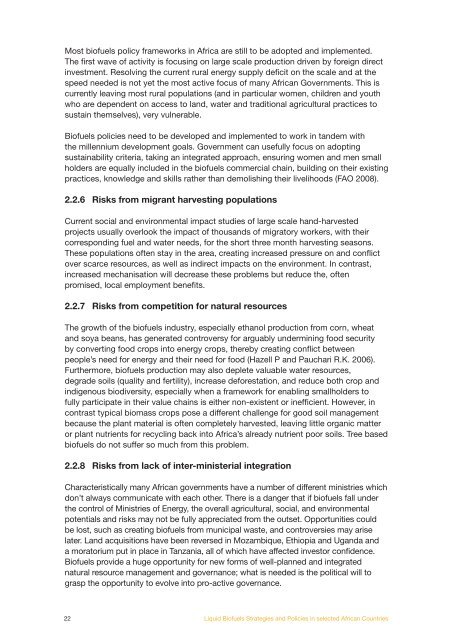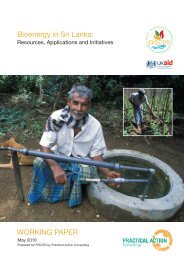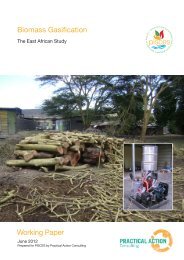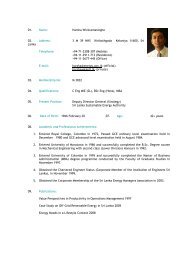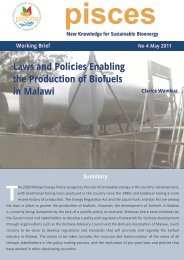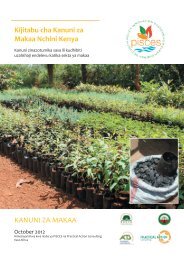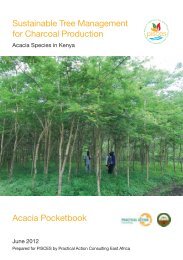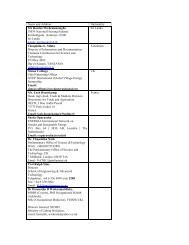Liquid Biofuels Strategies and Policies in selected African ... - Pisces
Liquid Biofuels Strategies and Policies in selected African ... - Pisces
Liquid Biofuels Strategies and Policies in selected African ... - Pisces
You also want an ePaper? Increase the reach of your titles
YUMPU automatically turns print PDFs into web optimized ePapers that Google loves.
Most biofuels policy frameworks <strong>in</strong> Africa are still to be adopted <strong>and</strong> implemented.The first wave of activity is focus<strong>in</strong>g on large scale production driven by foreign direct<strong>in</strong>vestment. Resolv<strong>in</strong>g the current rural energy supply deficit on the scale <strong>and</strong> at thespeed needed is not yet the most active focus of many <strong>African</strong> Governments. This iscurrently leav<strong>in</strong>g most rural populations (<strong>and</strong> <strong>in</strong> particular women, children <strong>and</strong> youthwho are dependent on access to l<strong>and</strong>, water <strong>and</strong> traditional agricultural practices tosusta<strong>in</strong> themselves), very vulnerable.<strong>Biofuels</strong> policies need to be developed <strong>and</strong> implemented to work <strong>in</strong> t<strong>and</strong>em withthe millennium development goals. Government can usefully focus on adopt<strong>in</strong>gsusta<strong>in</strong>ability criteria, tak<strong>in</strong>g an <strong>in</strong>tegrated approach, ensur<strong>in</strong>g women <strong>and</strong> men smallholders are equally <strong>in</strong>cluded <strong>in</strong> the biofuels commercial cha<strong>in</strong>, build<strong>in</strong>g on their exist<strong>in</strong>gpractices, knowledge <strong>and</strong> skills rather than demolish<strong>in</strong>g their livelihoods (FAO 2008).2.2.6 Risks from migrant harvest<strong>in</strong>g populationsCurrent social <strong>and</strong> environmental impact studies of large scale h<strong>and</strong>-harvestedprojects usually overlook the impact of thous<strong>and</strong>s of migratory workers, with theircorrespond<strong>in</strong>g fuel <strong>and</strong> water needs, for the short three month harvest<strong>in</strong>g seasons.These populations often stay <strong>in</strong> the area, creat<strong>in</strong>g <strong>in</strong>creased pressure on <strong>and</strong> conflictover scarce resources, as well as <strong>in</strong>direct impacts on the environment. In contrast,<strong>in</strong>creased mechanisation will decrease these problems but reduce the, oftenpromised, local employment benefits.2.2.7 Risks from competition for natural resourcesThe growth of the biofuels <strong>in</strong>dustry, especially ethanol production from corn, wheat<strong>and</strong> soya beans, has generated controversy for arguably underm<strong>in</strong><strong>in</strong>g food securityby convert<strong>in</strong>g food crops <strong>in</strong>to energy crops, thereby creat<strong>in</strong>g conflict betweenpeople’s need for energy <strong>and</strong> their need for food (Hazell P <strong>and</strong> Pauchari R.K. 2006).Furthermore, biofuels production may also deplete valuable water resources,degrade soils (quality <strong>and</strong> fertility), <strong>in</strong>crease deforestation, <strong>and</strong> reduce both crop <strong>and</strong><strong>in</strong>digenous biodiversity, especially when a framework for enabl<strong>in</strong>g smallholders tofully participate <strong>in</strong> their value cha<strong>in</strong>s is either non-existent or <strong>in</strong>efficient. However, <strong>in</strong>contrast typical biomass crops pose a different challenge for good soil managementbecause the plant material is often completely harvested, leav<strong>in</strong>g little organic matteror plant nutrients for recycl<strong>in</strong>g back <strong>in</strong>to Africa’s already nutrient poor soils. Tree basedbiofuels do not suffer so much from this problem.2.2.8 Risks from lack of <strong>in</strong>ter-m<strong>in</strong>isterial <strong>in</strong>tegrationCharacteristically many <strong>African</strong> governments have a number of different m<strong>in</strong>istries whichdon’t always communicate with each other. There is a danger that if biofuels fall underthe control of M<strong>in</strong>istries of Energy, the overall agricultural, social, <strong>and</strong> environmentalpotentials <strong>and</strong> risks may not be fully appreciated from the outset. Opportunities couldbe lost, such as creat<strong>in</strong>g biofuels from municipal waste, <strong>and</strong> controversies may ariselater. L<strong>and</strong> acquisitions have been reversed <strong>in</strong> Mozambique, Ethiopia <strong>and</strong> Ug<strong>and</strong>a <strong>and</strong>a moratorium put <strong>in</strong> place <strong>in</strong> Tanzania, all of which have affected <strong>in</strong>vestor confidence.<strong>Biofuels</strong> provide a huge opportunity for new forms of well-planned <strong>and</strong> <strong>in</strong>tegratednatural resource management <strong>and</strong> governance; what is needed is the political will tograsp the opportunity to evolve <strong>in</strong>to pro-active governance.3. Economic <strong>and</strong> policy drivers <strong>and</strong> responses<strong>in</strong> biofuels developmentAs outl<strong>in</strong>ed above, the ma<strong>in</strong> global drivers fall <strong>in</strong>to four ma<strong>in</strong> categories:Energy security <strong>and</strong> diversification: Ever <strong>in</strong>creas<strong>in</strong>g global human populations <strong>and</strong>dem<strong>and</strong> for cheap energy, added to the imm<strong>in</strong>ent threat of ‘Peak Oil’, the political<strong>in</strong>stability <strong>and</strong> oil-<strong>in</strong>duced wars <strong>in</strong> many oil p sroduc<strong>in</strong>g nations, as well as rapidlyfluctuat<strong>in</strong>g oil prices, have all stimulated a serious drive <strong>in</strong> research <strong>and</strong> <strong>in</strong>vestment<strong>in</strong>to alternative energy sources, as well as energy efficiency. As prices fluctuate,fossil fuel importers seek to reduce their import bills <strong>and</strong> develop greater energydiversification <strong>and</strong> self-sufficiency.Slow<strong>in</strong>g climate change: The majority of scientists are <strong>in</strong> agreement that the burn<strong>in</strong>gof fossil fuels <strong>and</strong> l<strong>and</strong> use changes are actively contribut<strong>in</strong>g to rapid climate <strong>and</strong>weather pattern changes, which is also driv<strong>in</strong>g the search for ‘renewable’ energy <strong>and</strong>the stimulation of potential carbon markets.Susta<strong>in</strong>able rural <strong>and</strong> agricultural development: In develop<strong>in</strong>g Africa, the drive todevelop biofuels is also be<strong>in</strong>g fuelled by the realisation that unsusta<strong>in</strong>able dependenceon wood fuel is lead<strong>in</strong>g to rapid deforestation, seriously threaten<strong>in</strong>g water catchmentareas <strong>and</strong> l<strong>and</strong> productivity, as well as wildlife <strong>and</strong> biodiversity. The greatest challengesare, <strong>and</strong> will be, <strong>in</strong> the arid <strong>and</strong> semi arid l<strong>and</strong>s of the many <strong>African</strong> countries.Economic drivers: As stock exchange markets develop, more <strong>and</strong> more <strong>in</strong>vestorsare turn<strong>in</strong>g to the Energy sector as an <strong>in</strong>vestment opportunity. This has led todevelopment of varied <strong>in</strong>vestment opportunities particular <strong>in</strong> <strong>African</strong> Countries. Theissue with economic drivers is not so much the fear of climate change or energy<strong>in</strong>security but rather the need to make a return on the <strong>in</strong>vestment done. This has hadboth positive <strong>and</strong> negative impacts.Many countries have responded to these drivers <strong>and</strong> challenges with either biofuels<strong>Policies</strong>, or at least government supported strategies. Key approaches identified fromnational policies <strong>and</strong> strategies <strong>in</strong>clude:3.1 Best practices aspects/<strong>in</strong>gredients <strong>in</strong> develop<strong>in</strong>ga national biofuels <strong>in</strong>dustry• Large-scale public <strong>in</strong>vestment <strong>in</strong>to coord<strong>in</strong>ated National research <strong>and</strong> developmentprogrammes on feedstock development <strong>and</strong> distribution to farmers, <strong>in</strong>clud<strong>in</strong>gcertify<strong>in</strong>g <strong>in</strong>stitutions/organisations (e.g. EMBRAPA Brazil, Indian Governmentcentre for biomass research (over 400 species under <strong>in</strong>vestigation), BDFZ Germany,Nigeria.• Large-scale public <strong>in</strong>vestment <strong>in</strong>to coord<strong>in</strong>ated research <strong>and</strong> development ofeach section of the value cha<strong>in</strong> with close l<strong>in</strong>kages to the private sector producers<strong>and</strong> distributors to improve efficiencies <strong>and</strong> br<strong>in</strong>g down production costs to becompetitive with fossil fuels (e.g. PROALCOOL <strong>in</strong> Brazil, India, USA <strong>and</strong> Canada).• A national registry of feedstock availability, process<strong>in</strong>g facilities <strong>and</strong> up-take toprovide necessary data for price reviews to avoid a mismatch between supply <strong>and</strong>dem<strong>and</strong> (example of what happened <strong>in</strong> India).• Focus on pro-poor rural development led by small-scale farmers; models of22 <strong>Liquid</strong> <strong>Biofuels</strong> <strong>Strategies</strong> <strong>and</strong> <strong>Policies</strong> <strong>in</strong> <strong>selected</strong> <strong>African</strong> Countries <strong>Liquid</strong> <strong>Biofuels</strong> <strong>Strategies</strong> <strong>and</strong> <strong>Policies</strong> <strong>in</strong> <strong>selected</strong> <strong>African</strong> Countries 23


